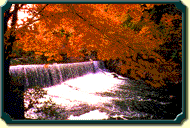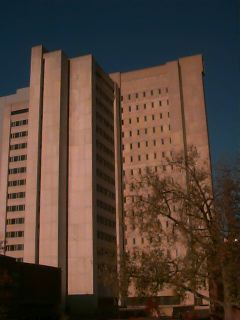Whose woods these are, I think I know...
 My job was in the chem lab, though, and neither Robert Frost nor Emily Dickinson, both of whom lived in
Amherst, Massachusetts long before I got there had anything to fear from any iambs of mine.
My job was in the chem lab, though, and neither Robert Frost nor Emily Dickinson, both of whom lived in
Amherst, Massachusetts long before I got there had anything to fear from any iambs of mine.
Getting a Ph.D. in chemistry takes about five years of long days (and nights) and there was very little time
left over for extracurricular endeavors. I had matriculated in the Fall of 1968 and the courses
that I took at that time, like all of our courses, expired after seven years so, given my
African sojourns, I had no time to waste.
If one did not finish in time, old courses had to be repeated since they were now out-of-date.
As my major professor,
Bernie Miller,
used to say, "Science never sleeps." Some of what you learned became
obsolete after a while. There was one grad student in our department who had been trying to finish for 15
years. Chemistry can be difficult!
One reason that it may sometimes take a while is that, in order to get a Ph.D., you have to publish an original
thesis. That is, you must make an original contribution to the state-of-the-art that increases the body of knowledge
in your chosen field. In my third year of graduate school, and after having done research on my thesis for a year, Bernie
came into
the lab one day and let me know that we had competition and that, perhaps, it might be a good idea if I trekked over
to
Harvard
(about 100 miles to the East) to check it out. Their weekly seminar in organic chemistry would supposedly
provide all the details.
Sure enough, I'd been scooped! All of the experiments that I had been planning
to do had just been completed at Princeton, with the results that we had expected to see. I had to start from scratch
with a new thesis. At least, I had the satisfaction of knowing that what I had been doing would have worked, eventually, although it
was apparent that it would have been a long road.
 Obviously, I was not going to set any records for completion time but that was fine with me. Apart from a slight
concern for the ephemeral nature of course credits, I was in no hurry.
UMass/Amherst is a very pleasant spot.
My laboratory was on the top (sixteenth) floor of the Graduate Research Center (left) and we had a fine view.
Morever, I enjoyed academic life very much. Also, a short
ride on a free(!) bus would take me to any of four other nearby colleges: Amherst, Hampshire, Smith, and Mount
Holyoke. There was never any lack of intellectual stimulation.
Obviously, I was not going to set any records for completion time but that was fine with me. Apart from a slight
concern for the ephemeral nature of course credits, I was in no hurry.
UMass/Amherst is a very pleasant spot.
My laboratory was on the top (sixteenth) floor of the Graduate Research Center (left) and we had a fine view.
Morever, I enjoyed academic life very much. Also, a short
ride on a free(!) bus would take me to any of four other nearby colleges: Amherst, Hampshire, Smith, and Mount
Holyoke. There was never any lack of intellectual stimulation.
Even better, the university offered courses in animal husbandry and other agricultural pursuits and, therefore, our
1100 acres included a farm and livestock. After having shared the countryside with elephants, and lions, etc., I was pleased to make a
passing acquaintance with cows and horses. I even discovered, with some surprise, that "swine" was not, after all,
the plural of "swan." Indeed, we had both.
Most of my time, however, was spent with aldehydes, ketones, ethers, and the like which,
as you can see,
are not like cows and horses. The skills that I mastered were relatively obscure as well. My favorites were steam distillation and
zone refining which can be impressive when they succeed. I won't bore you with the details.
The point of all of this effort was to prove a thesis. Just for the record, here it is: The electrophilic benzylation and
allylation of 2,6-dialkylphenol and its ethers give predominantly meta-substitution even though the Hammett
equation predicts otherwise. Moreover, this anomaly is not the result of the expected substitution, followed by a
rearrangement.
There. Isn't that something you always wondered about? Proving this hypothesis took me nearly three years.
The hardest part of graduate school was a factor that I had never anticipated. There is an old story that sums it
up quite nicely:
|
Two Downeast farmers, Enoch and Amos, are chatting about Enoch's recent train ride to New York City, his first trip outside
of Maine.
"So, Enoch, how'd you like New Yawk?"
"Well, y'know," Enoch replies, "there was so much goin' on at the station, I never got to
see t'other."
|
Graduate school was a bit like that, too. Even though it was a somewhat cloistered existence, with a focus that very few would
find at all compelling, there was just too much going on all the time. It was hard to concentrate on my own work.
Eventually, I mananged to do so. I finished in 1977 with a Ph.D. in Organic Chemistry and was now ready for my first "real"
job. I eased into it by taking a one-year faculty position in
Illinois.
 Obviously, I was not going to set any records for completion time but that was fine with me. Apart from a slight
concern for the ephemeral nature of course credits, I was in no hurry.
UMass/Amherst is a very pleasant spot.
My laboratory was on the top (sixteenth) floor of the Graduate Research Center (left) and we had a fine view.
Morever, I enjoyed academic life very much. Also, a short
ride on a free(!) bus would take me to any of four other nearby colleges: Amherst, Hampshire, Smith, and Mount
Holyoke. There was never any lack of intellectual stimulation.
Obviously, I was not going to set any records for completion time but that was fine with me. Apart from a slight
concern for the ephemeral nature of course credits, I was in no hurry.
UMass/Amherst is a very pleasant spot.
My laboratory was on the top (sixteenth) floor of the Graduate Research Center (left) and we had a fine view.
Morever, I enjoyed academic life very much. Also, a short
ride on a free(!) bus would take me to any of four other nearby colleges: Amherst, Hampshire, Smith, and Mount
Holyoke. There was never any lack of intellectual stimulation.
 My job was in the chem lab, though, and neither Robert Frost nor Emily Dickinson, both of whom lived in
Amherst, Massachusetts long before I got there had anything to fear from any iambs of mine.
My job was in the chem lab, though, and neither Robert Frost nor Emily Dickinson, both of whom lived in
Amherst, Massachusetts long before I got there had anything to fear from any iambs of mine.